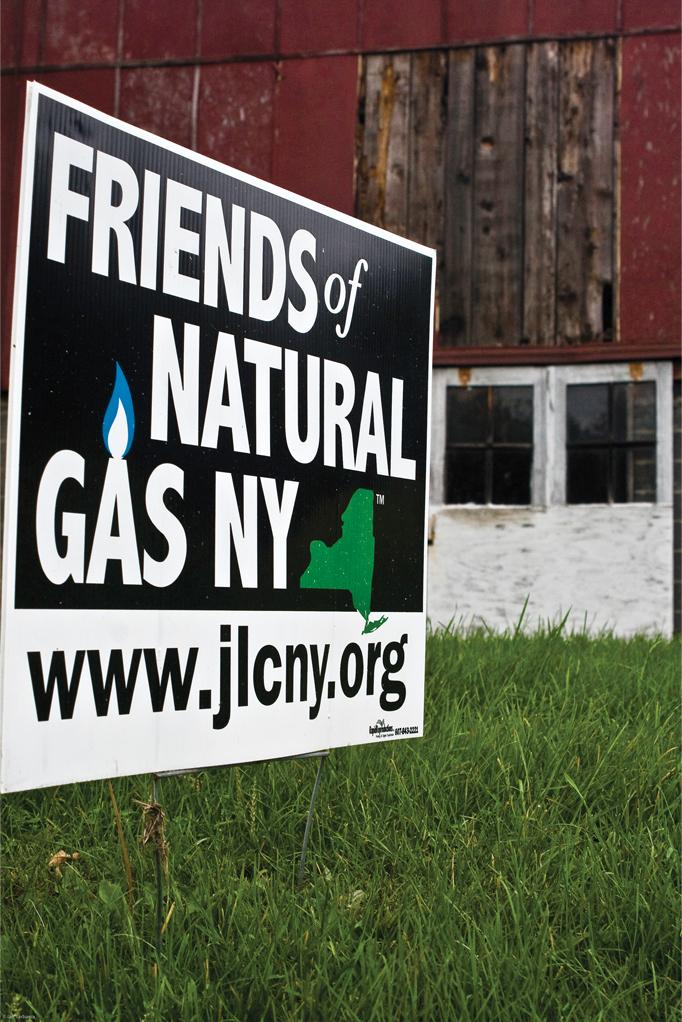
Denver-based gas company Anschutz Exploration Corporation filed a lawsuit Friday, Sept. 16 against the Town of Dryden, a municipality about 40 miles from Binghamton in Tompkins County, in an effort to strike down the town’s zoning ordinances and regulations that prohibit oil and gas drilling. The lawsuit is the first in New York to challenge a town’s ability to ban hydraulic fracturing, or “fracking,” a method of drilling for natural gas, and it could potentially have a significant impact on the legality of similar fracking bans enacted in 15 other New York municipalities.
Fracking releases natural gas from subsurface rock formations by drilling into the ground and pumping millions of gallons of water laced with chemicals down to fracture the bedrock, allowing the gas to bubble up to the surface. The Southern Tier sits on top of the Marcellus Shale, a formation of rock stretching beneath several states that contains one of the country’s largest deposits of natural gas.
Whether the government should allow fracking to take place has become a contentious political issue since large amounts of natural gas were found in the Marcellus Shale. Those opposed to the practice say the chemicals and other contaminants involved in the drilling can seep into and contaminate drinking water supplies.
The New York State Department of Enivronmental Conservation ruled this year that fracking can be permitted to take place in several New York counties, including Broome, Cattaraugus, Chemung, Chenango, Delaware and Tioga Counties. Fracking is still not legally allowed in New York at present, however, while the DEC completes a review process of its findings.
Anschutz’s lawsuit argues that local governments in New York like the Town of Dryden overstep their powers if they attempt to regulate oil and gas industries, because the state’s Environmental Conservation Law specifies that only the state government may do so.
Thomas West, the Albany-based attorney who represents Anschutz, said the company’s lawsuit “is based upon the fact that the Environmental Conservation Law contains a very broad express preemption provision that … prohibits towns from enacting any local laws or ordinances that relate to oil and gas drilling, period.”
“The only two exceptions are the regulation of local roads and taxation,” West said. “What the Town has done goes well beyond that.”
Joseph Solomon, a member of the Dryden Town Board, defended the town’s ban on the basis that it protects the interests of Dryden residents.
“Our town values the community, it values its agriculture, it values our way of life,” Solomon said. “Ninety percent of the people get their water through wells. We’re looking at putting in place optimal protection measures … [and with] the information we have available and with the chemicals used in hydrofracking, any type of accident could be detrimental to tens, hundreds of water supplies for the town.”
Solomon also asserted that most Dryden residents agreed with him.
“[The Town had] public information meetings for residents to voice their opinions, and throughout this whole process a large majority … did not want to see hydrofracking within the town,” Solomon said.
Oral arguments are set to begin in the Anschutz suit in Tomkins County Supreme Court in Ithaca on Friday, Nov. 4.
The Dryden lawsuit was filed one day after the Cooperstown Holstein Corporation, which represents a group of landowners in Middlefield united in opposition to their town’s fracking ban, filed a similar lawsuit Thursday, Sept. 15.
Jennifer Huntington, who had leased part of her property for fracking, said she and the other Otsego County landowners who joined the suit against the Town of Middlefield felt that their “property rights were being infringed.”
West and Huntington both said they believed fracking poses no greater threat than many other accepted industrial practices.
“I don’t think hydraulic fracturing or natural gas drilling is unsafe,” West said. “I think New York has an excellent track record. There’s 14,000 wells in New York, many of which have been hydraulically fractured, that have been drilled and operated without any environmental incidents.”
Huntington also said she was not worried about potential detrimental environmental effects caused by fracking.
“If I thought this would destroy my water or my property, I would not be interested in it,” she said.
Brendan Woodruff, the hydrofracking campaign organizer for the Binghamton University chapter of New York Public Interest Research Group (NYPIRG), said he thought that the towns were justified in acting to protect the health and safety of their residents.
Jenna Fierstein, the president of Student Environmental Action Coalition (SEAC) and a senior majoring in environmental studies who interned with the DEC this summer, agreed, but said she believed that power to regulate fracking might properly lie with the U.S. Congress under the Interstate Commerce Clause of the U.S. Constitution, as the gas that companies extract is often transported across state lines.
“With regard to the ban being upheld as a form of zoning regulation, I would think it still subject to the Interstate Commerce Clause,” Fierstein said. “However, the prevention of fracking is legitimately in the interest of the public health, safety and welfare, and so it may – and I think should – still hold valid.”


